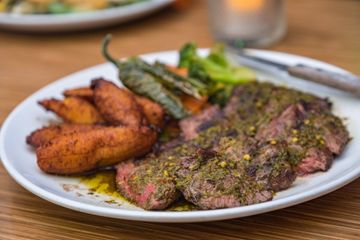Enjoy fast take out and delivery options for your next Mexican meal
Is Mexican Food Healthy? Unloading the Nutritional Perks of Traditional Components
The concern of whether Mexican food is healthy and balanced invites an exploration of its typical active ingredients. Beans and corn function as fundamental staples, abundant in healthy protein and fiber. Avocados give valuable fats, while different natural herbs and flavors include flavor and wellness benefits - mexican food. Together, these parts create a tapestry of nutrition. However, the healthiness of Mexican food commonly depends on prep work methods and section sizes. What function do these aspects play in identifying its overall nutritional worth?
The Power of Beans: Healthy Protein and Fiber-Rich Staples
Although typically overlooked, beans work as a foundation of Mexican food, providing a wide range of nutritional advantages. Rich in healthy protein, they are an excellent plant-based choice for those looking for to meet their nutritional protein needs. This high healthy protein web content supports muscle mass fixing and growth, making beans vital for both meat-eaters and vegetarians alike. In addition, beans are an extraordinary resource of nutritional fiber, which assists in food digestion and promotes a feeling of volume, possibly helping with weight management.
The variety of beans made use of in Mexican recipes, such as black beans, pinto beans, and kidney beans, adds to a varied taste account and can improve meals nutritionally. Additionally, beans are reduced in fat and consist of necessary nutrients, consisting of iron, folate, and magnesium. Together, these attributes make beans a critical ingredient, providing both nourishment and food in standard Mexican price.

Corn: a Versatile Grain With Nutritional Conveniences
Corn sticks out as a flexible grain basic to Mexican food, commemorated not just for its cooking applications yet also for its excellent dietary profile. As a key active ingredient in meals like tortillas, tamales, and pozole, corn gives necessary nutrients that add to a well balanced diet. Rich in carbohydrates, it acts as a substantial energy source, while likewise being reduced in fat, making it a desirable choice for numerous nutritional demands.
Moreover, corn is a great source of dietary fiber, which assists in digestion and promotes satiation. It has considerable quantities of vitamins such as B-complex vitamins, which are important for basal metabolism. The visibility of anti-oxidants, specifically carotenoids, adds to overall health and wellness by lowering oxidative stress and anxiety. In addition, corn is gluten-free, providing to those with gluten sensitivities. Overall, the dietary advantages of corn highlight its relevance in standard Mexican food and its function in a healthy diet regimen.
Avocados: Healthy And Balanced Fats and Nutrients in Every Bite
Avocados play a substantial duty in Mexican cuisine, enhancing meals with their creamy appearance and abundant taste. Past their cooking appeal, avocados are celebrated for their impressive dietary account. They are a rich resource of healthy and balanced monounsaturated fats, which can assist lower bad cholesterol degrees and support heart health. Additionally, avocados are loaded with essential minerals and vitamins, including potassium, vitamin E, and B vitamins, contributing to total wellness.
The high fiber content in avocados aids food digestion and promotes satiety, making them a valuable enhancement to any kind of dish. Their distinct nutrient make-up can likewise sustain skin health and wellness and supply anti-inflammatory advantages. Including avocados into typical Mexican meals or appreciating them as a standalone treat can enhance both flavor and nutrition, showing why they are a precious read more staple in Mexican cuisine. Overall, avocados offer a scrumptious method to enjoy healthy fats and essential nutrients in every bite.

Natural Herbs and spices: Flavorful Health And Wellness Boosters
While appreciating the abundant flavors of Mexican cuisine, one can not ignore the important duty that spices and herbs play in enhancing both preference and health. Components such as cilantro, oregano, and chili peppers not just add to the vivid taste account yet likewise provide significant wellness advantages. Cilantro is recognized for its cleansing homes, helping to remove hefty steels from the body, while oregano is loaded with antioxidants and possesses anti-inflammatory results.
Chili peppers, a staple in lots of Mexican meals, include capsaicin, which has actually been linked to enhanced metabolism and pain relief. In addition, flavors like cumin and coriander assistance food digestion and might help in blood sugar regulation. Including these flavorful health boosters right into meals not only enhances the culinary experience however additionally promotes general wellness, making Mexican food not simply tasty, however also nutritionally beneficial.
Traditional Cooking Methods: Enhancing Nourishment and Taste
Conventional food preparation techniques in Mexican he said cuisine play a vital duty in boosting both nourishment and flavor, as they usually focus on classic methods and fresh ingredients. Techniques such as nixtamalization, where corn is saturated and cooked in an alkaline remedy, not only enhance the nutrient account of tortillas but additionally enhance their digestibility - churros. In addition, using slow-moving food preparation approaches, like stewing or braising, allows tastes to combine magnificently while keeping the stability of the ingredients

Regularly Asked Concerns
Are Mexican Food Portions Commonly Larger Than Other Cuisines?
Mexican food portions are commonly larger than those of lots of various other foods. This particular mirrors typical eating practices, emphasizing communal sharing and hearty dishes, which can cause an extra considerable serving size overall.
Exactly how Does the Preparation Method Affect Healthfulness of Mexican Food?
Prep work techniques considerably affect the healthfulness of Mexican food. Strategies such as grilling or steaming protect nutrients, while frying can boost unhealthy fat web content. Choices of active ingredients and cooking designs inevitably determine total nutritional value.
Can Mexican Food Be Customized for Certain Dietary Constraints?
Mexican food can undoubtedly be customized for specific dietary limitations. Alternatives, such as using corn tortillas for gluten-free diet regimens or including even more veggies, make it possible for individuals to appreciate traditional tastes while accommodating different dietary demands.
What Prevail Misunderstandings About Mexican Food and Health?
Common misconceptions regarding Mexican food consist of the belief that it is inherently undesirable, overly hot, and entirely concentrated on fats. In truth, conventional recipes commonly include healthy ingredients and can be customized to numerous nutritional needs.
Are There Healthier Alternatives at Mexican Restaurants?
Healthier options at Mexican restaurants usually consist of barbequed sites meats, beans, and fresh vegetables. Selecting recipes that highlight whole ingredients and staying clear of heavy sauces can bring about an extra healthy dining experience, advertising overall health.
The selection of beans utilized in Mexican recipes, such as black beans, pinto beans, and kidney beans, adds to a diverse taste profile and can boost meals nutritionally. Avocados play a considerable role in Mexican food, matching recipes with their creamy structure and rich flavor. Integrating avocados into conventional Mexican recipes or enjoying them as a standalone snack can boost both taste and nutrition, demonstrating why they are a precious staple in Mexican cuisine. While enjoying the abundant flavors of Mexican food, one can not forget the vital function that spices and herbs play in boosting both preference and health. Typical cooking techniques in Mexican food play a vital duty in enhancing both nutrition and taste, as they frequently focus on fresh active ingredients and time-honored methods.